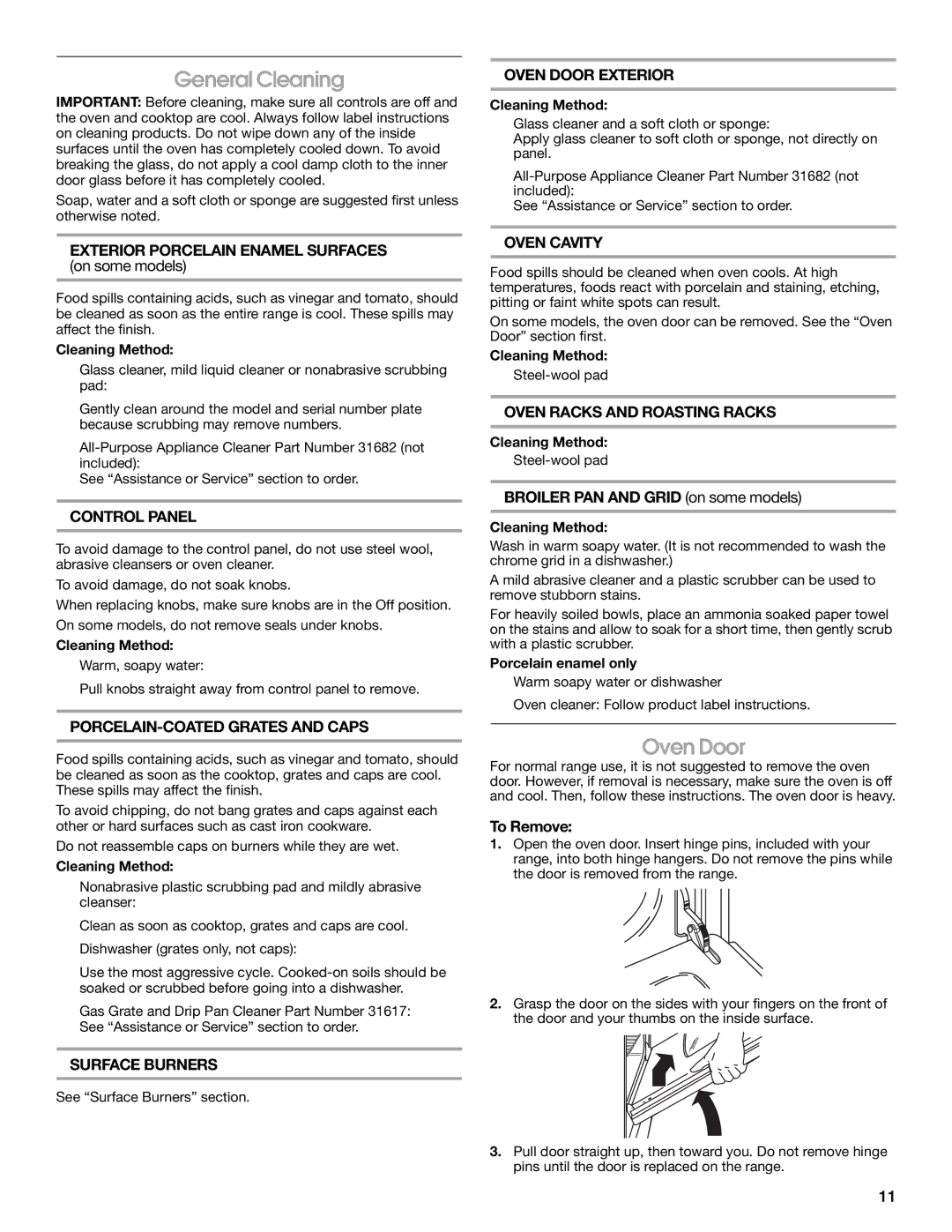
General Cleaning
IMPORTANT: Before cleaning, make sure all controls are off and the oven and cooktop are cool. Always follow label instructions on cleaning products. Do not wipe down any of the inside surfaces until the oven has completely cooled down. To avoid breaking the glass, do not apply a cool damp cloth to the inner door glass before it has completely cooled.
Soap, water and a soft cloth or sponge are suggested first unless otherwise noted.
EXTERIOR PORCELAIN ENAMEL SURFACES
(on some models)
Food spills containing acids, such as vinegar and tomato, should be cleaned as soon as the entire range is cool. These spills may affect the finish.
Cleaning Method:
■Glass cleaner, mild liquid cleaner or nonabrasive scrubbing pad:
Gently clean around the model and serial number plate because scrubbing may remove numbers.
■
See “Assistance or Service” section to order.
CONTROL PANEL
To avoid damage to the control panel, do not use steel wool, abrasive cleansers or oven cleaner.
To avoid damage, do not soak knobs.
When replacing knobs, make sure knobs are in the Off position.
On some models, do not remove seals under knobs.
Cleaning Method:
■Warm, soapy water:
Pull knobs straight away from control panel to remove.
PORCELAIN-COATED GRATES AND CAPS
Food spills containing acids, such as vinegar and tomato, should be cleaned as soon as the cooktop, grates and caps are cool. These spills may affect the finish.
To avoid chipping, do not bang grates and caps against each other or hard surfaces such as cast iron cookware.
Do not reassemble caps on burners while they are wet.
Cleaning Method:
■Nonabrasive plastic scrubbing pad and mildly abrasive cleanser:
Clean as soon as cooktop, grates and caps are cool.
■Dishwasher (grates only, not caps):
Use the most aggressive cycle.
■Gas Grate and Drip Pan Cleaner Part Number 31617: See “Assistance or Service” section to order.
SURFACE BURNERS
See “Surface Burners” section.
OVEN DOOR EXTERIOR
Cleaning Method:
■Glass cleaner and a soft cloth or sponge:
Apply glass cleaner to soft cloth or sponge, not directly on panel.
■
See “Assistance or Service” section to order.
OVEN CAVITY
Food spills should be cleaned when oven cools. At high temperatures, foods react with porcelain and staining, etching, pitting or faint white spots can result.
On some models, the oven door can be removed. See the “Oven Door” section first.
Cleaning Method:
■
OVEN RACKS AND ROASTING RACKS
Cleaning Method:
■
BROILER PAN AND GRID (on some models)
Cleaning Method:
Wash in warm soapy water. (It is not recommended to wash the chrome grid in a dishwasher.)
A mild abrasive cleaner and a plastic scrubber can be used to remove stubborn stains.
For heavily soiled bowls, place an ammonia soaked paper towel on the stains and allow to soak for a short time, then gently scrub with a plastic scrubber.
Porcelain enamel only
■Warm soapy water or dishwasher
■Oven cleaner: Follow product label instructions.
Oven Door
For normal range use, it is not suggested to remove the oven door. However, if removal is necessary, make sure the oven is off and cool. Then, follow these instructions. The oven door is heavy.
To Remove:
1.Open the oven door. Insert hinge pins, included with your range, into both hinge hangers. Do not remove the pins while the door is removed from the range.
2.Grasp the door on the sides with your fingers on the front of the door and your thumbs on the inside surface.
3.Pull door straight up, then toward you. Do not remove hinge pins until the door is replaced on the range.
11
